This year I am going through an alphabet of news items taken from The Emancipator newspaper, published between 1917 and 1920 in Montgomery, Alabama. Most are about my grandparent’s circle of friends. All of the news items were found on Newspapers.com. Each item is transcribed directly below the clipping. Click on any image to enlarge.
________________
Jennie Turner was Fannie’s mother and my great grandmother. I knew her for a few years before she died when she was wheelchair bound and not really talkative. I knew my aunts Daisy and Alice for many years.
“Mrs. Jennie Turner and two daughter, Miss Daisy and little Alice, left last Friday for Detroit, Mich.”
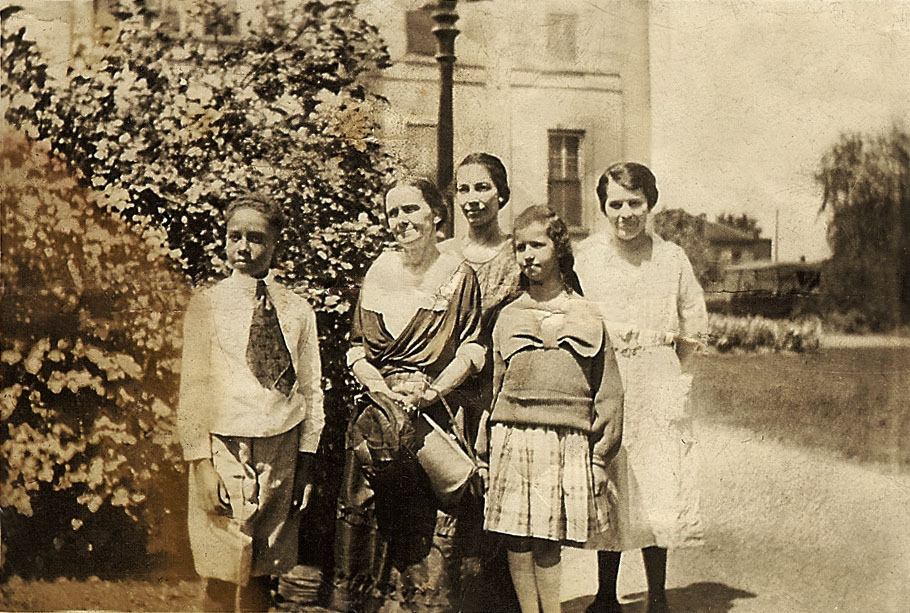
My great grandmother Jennie and daughters were coming to visit my grandparents and their new baby daughter, Mary Virginia, who was born in April of 1920. They didn’t move to Detroit until 1922. My grandmother was a seamstress who worked for herself in Montgomery. My aunt Daisy taught school. In the photo with them are my great grandmother’s sister Beulah, who was also a seamstress, and her son Robert. The photo was labeled as being taken in 1921. Perhaps they came up again to visit when my grandparents second child, Mershell Jr. was born.
___________________
My mother Doris Graham Cleage’s memories of her grandmother, Jennie Virginia Allen Turner
Today I’m going to write about Grandmother. Grandmother Turner was born about 1872, nine years after the Emancipation Proclamation. Don’t know if she finished high school – but she did go. Her mother taught her to sew and it was a good thing she did because grandmother worked the rest of her life supporting herself and her children at sewing. That is, she worked after husband Howard Turner died. They married when she was about sixteen. Don’t know his age. He looked something like grandmother’s father and also like my father, mother said. He was a farmer’s son from around Hayneville, AL, but he preferred the big city – Montgomery. His father had three sons and planned to give each one a large share of the farm when they married. Howard and Jenny received their farm, but neither one liked the country. One day they were in Montgomery. He was at a Bar-B-Q. She was at her parents with their daughters, Fannie Mae, 4, and Daisy Pearl, 2. someone brought word that he had been shot dead. Apparently no one ever knew who did it, but mother always said grandmother thought his father had it done because he was angry that Howard would not farm and had even been talking about selling his part. The father did not want the land sold, but wanted it to stay in the family forever. (Bless his heart!). He and the son had had some terrible arguments before they left to come to the Bar-B-Q. I often wondered why he was there and grandmother wasn’t. She always seemed to like a good time.
I remember her laughing and singing and dancing around the house on Theodore. She was short, about five feet I guess, with brown eyes, thin dark brown hair that she wore in a knot. She was very energetic, always walking fast. She always wore oxfords, often on the wrong feet, and never had time to change them. We used to love to tell her that her shoes were on the wrong feet. (smart kids!)
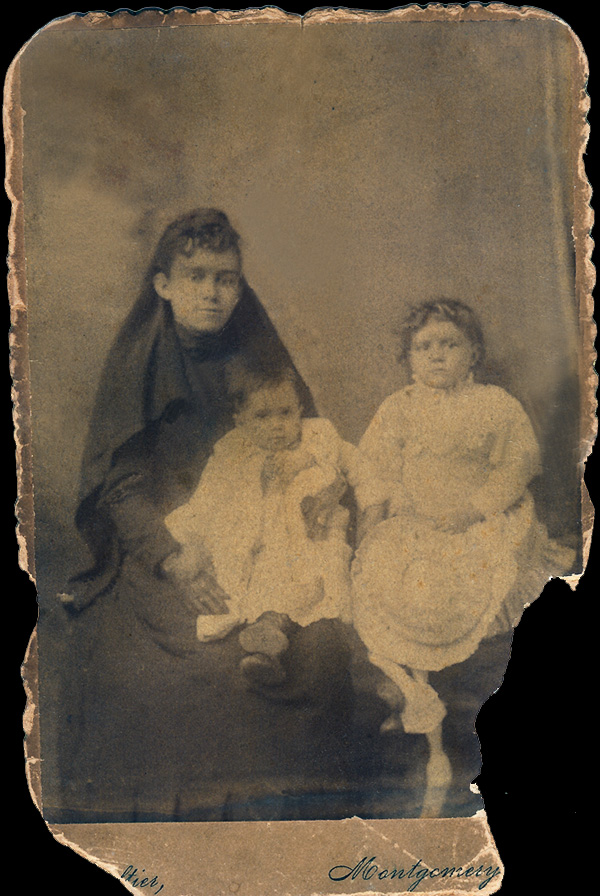
She never did thing with us like read to us or play with us, but she made us little dresses. I remember two in particular she made me that I especially liked. My “candy-striped” dress – a red white and blue small print percale. She put a small pleated ruffle around the collar and a larger one around the bottom. I was about Deignan’s (note: that would have been about 5) size, I guess, and I really thought I was cool! The other favorite was an “ensemble” – thin, pale green material with a small printed blue green and red flower in it – just a straight sleeveless dress with neck and sleeves piped in navy blue – and a three – quarter length coat of the same material – also straight -with long sleeves and lapels – also piped in navy blue. She never used a pattern. Saw something and made it! She taught us some embroidery which she did beautifully but not often. She never fussed at us – never criticized – and I think she rocked me in the upstairs hall on Theodore when I was little and sick. The rocker Daddy made stood in that hall. I remember lots of people rocking in that chair when I was small.
Grandmother went to work when her husband was murdered – sewing for white folks – out all day fitting and sewing – and sewing all night – finishing while mother and Daisy stayed with their Grandfather Allen, who would tell on them when Grandmother came home and she would spank them. Mother said she remembered telling Daisy to holler loudly so Grandmother wouldn’t spank them hard or long and it worked!
Grandmother stayed single until she was about 37 or 38 when she married someone Mother hated – looked Italian, hardly ever worked. Liked a good time. Fathered Alice and left when she was very small. Somehow when mother spoke of him I had the feeling he would have like to have taken advantage of her. She was about 20 and had given up two college scholarships to stay and help Grandmother.
Sometimes after her husband’s death, Grandmother took the deed to the farm to a white lawyer. (was there any other kind?) and told him to sell it for her. He went to see it and check it out – told her to forget it – her title wasn’t clear, but he never gave the deed back and she figured he made a deal with her father-in-law.
Aunt Abbie (note: Jennie’s sister) said the father-in-law built Grandmother and Howard a “shotgun” house on the farm. She would turn up her nose as she said it. You know that is a house like this – no doors on front or back, you could shoot a gun through hall without damage. Animals (pigs, dogs) would wander into the hall and have to be driven out. Aunt Abbie only stayed there when the plague was raging in Montgomery. Yellow fever (malaria) and/or polio every summer. Many people sick or dying. Huge bonfires in the streets every night to ‘purify’ the air”, and closing the city if it got bad enough – no one in or out. More than once they fled the city in a carriage through back streets and swamps because they were caught by the closing which was done suddenly to keep folks from leaving and spreading the “plague”
In Detroit, when they came in 1923 when Mother and Daddy had bought the house on Theodore and had room for them (room? only 5 adults and 3 children!) Grandmother, Daisy and Alice got good jobs, (they were good – sewing fur coats, clean work and good pay.) at Annis Furs (remember it back of Hudsons?) and soon had money to buy their own house much farther east on a “nice” street in a “better ” neighborhood (no factories) on Harding Ave. While they lived with us I remember violent arguments between Alice and I don’t know who – either Grandmother or Daisy or Mother. Certainly not Daddy because when he spoke it was like who in the Bible who said, “When I say go, they goeth. When I say come, they cometh.” Most of the time I remember him in the basement, the backyard or presiding at table. Daisy and grandmother were what we’d call talkers.
Grandmother got old, hurt her knee, it never healed properly. Daisy worked and supported the house alone. Alice only worked a little while. She had problems getting along with people. Grandmother was eventually senile. Died of a stroke at 83 or so. Alice spent years taking care of her while Daisy worked. Daisy added to their income by being head numbers writer at Annis!!
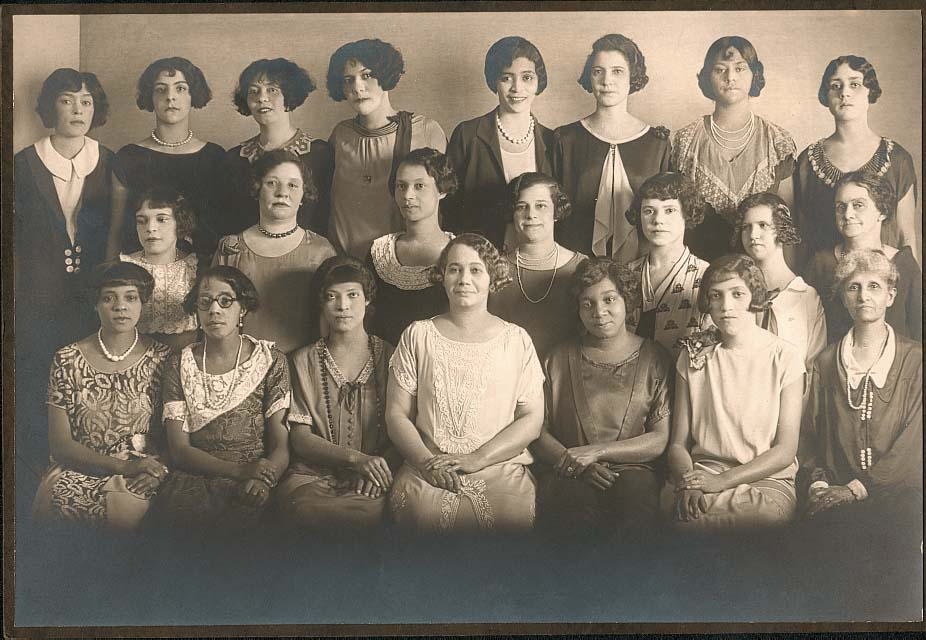
_______________________
This information came from family information. The photo is from my photo collection. The news item is from Newspapers.com. The links within the story are to other blog posts about the topic.
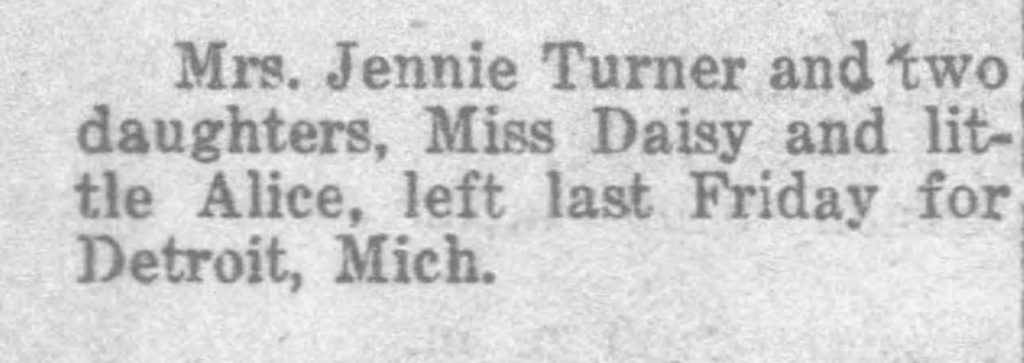
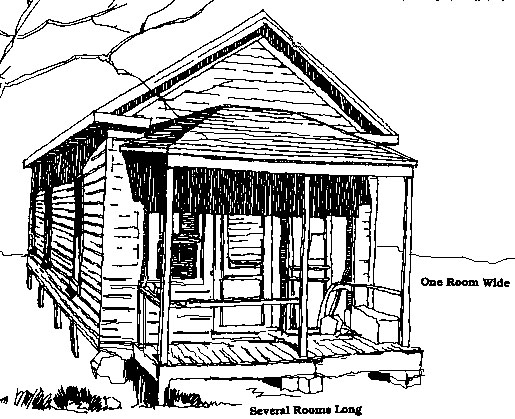
That must have been real hard on the lady, long but tough life. Loved the bit about the candy striped dress.
I wish I had pictures of those dresses!
I love these memory excerpts! 🙂 Dancing around with the shoes on the wrong feet… lovely 🙂
The Multicolored Diary: Weird Things in Hungarian Folktales
My mother died several years after she wrote these for my sister and me. I wish she had written more. They are invaluable.
Wonderful post today. My grandmother could make something by just looking at the picture too. I remember she made me an evening coat to wear over my prom dress in high school. Until I was into my teens, I wore nightgowns made out of recycled fabric.
Susanne Living the Dream
I can sew using a pattern, but I never even tried to make anything without a pattern. I don’t “see” clothes in a way that I could take them apart and “build” them from scratch.
I wish I had asked my mother to write her memories of her grandmothers. The details in this little memoir are just wonderful, so revealing. I’m sure you feel like you knew your great-grandmother.
I do feel that way. In fact, I grew up feeling like I knew my mother’s cousins and great aunts because she talked about them so much. And then she wrote them up for me!
The information you dig up and the records you have are extremely valuable as historic records of family development. I never cease to be amazed at the detail you uncover.
Sometimes I am amazed too.
I could read your wonderful stories forever! She very impressive and detailed! Absolutely invaluable to your family!
Sounds like a hardy lady, with a great deal of will.
Tasha
Tasha’s Thinkings – Movie Monsters
Great topic to write about. It’s always interesting to get a glimpse into the past
Debbie
So lucky you got the stories you did! I am too, my mom’s cousin got my great granny’s sister to write about the family. A treasure!
One grandmother and one great aunt made me many smoked dresses in different colours. After me, my parents had a daughter that died before her first birthday, my mom took us to granny’s and told dad to get rid of everything! She regretted not keeping the dresses when I had four dsughters… lol. Me too!!
At the time, though, I guess she didn’t want any reminders. Too bad she didn’t just pack them away until your daughters came along. I have 4 daughters too.
The dresses sound lovely. One of the things with that era is that all the photos are black and white so we don’t see the marvellous colours.
Beautiful memoir by your mother.
What is a head numbers writer (Daisy)
Regards
Anne
That’s true. I just picture them all in sepia.
I got this from Wikipedia about playing the numbers. “The numbers game, also known as the numbers racket, the policy racket, the Italian lottery, the policy game, or the daily number, is a form of illegal gambling or illegal lottery played mostly in poor and working class neighborhoods in the United States, wherein a bettor attempts to pick three digits to match those that will be randomly drawn the following day. In recent years, the “number” would be the last three digits of “the handle”, the amount race track bettors placed on race day at a major racetrack, published in racing journals and major newspapers in New York.
Gamblers place bets with a bookmaker (“bookie”) at a tavern, bar, barber shop, social club, or any other semi-private place that acts as an illegal betting parlor. Runners carry the money and betting slips between the betting parlors and the headquarters, called a numbers bank or policy bank. The name “policy” is based on the similarity to cheap insurance, which is also a gamble on the future.[1]”
I think the numbers writer – Daisy in this case, would take the bets in the store (the numbers people picked and their bet money) and pass them along to the numbers runner, who would take them to the center. She would get a cut.
Wow, what a rich episode today!